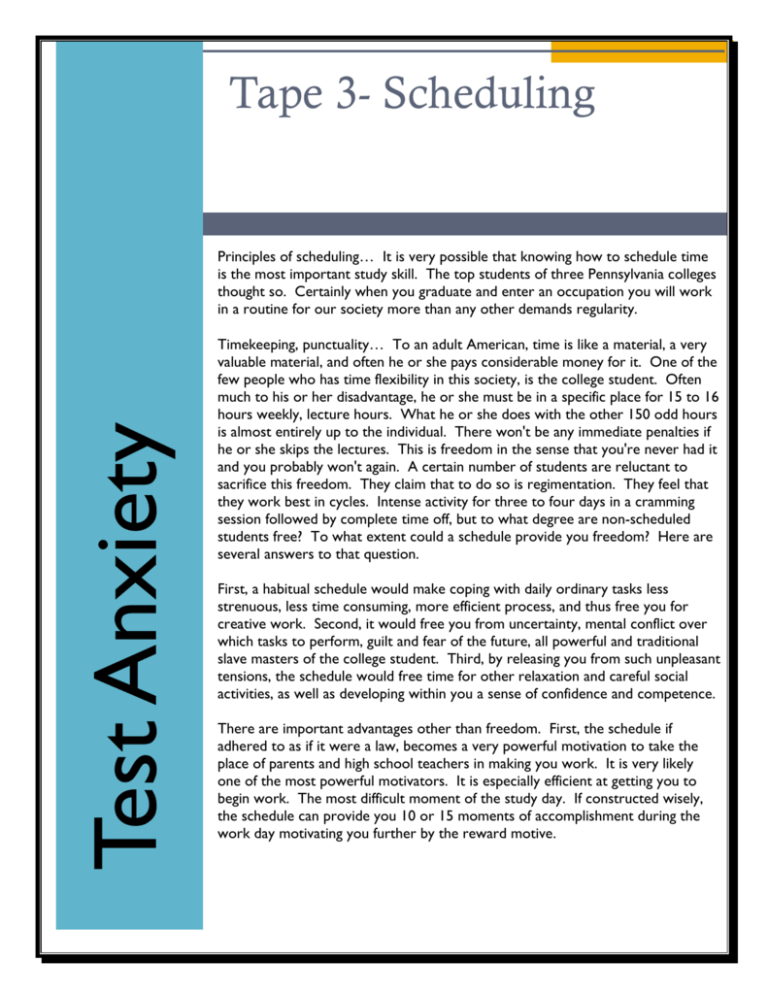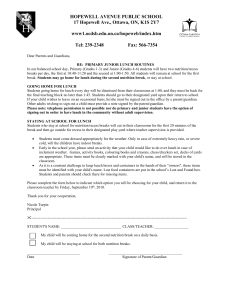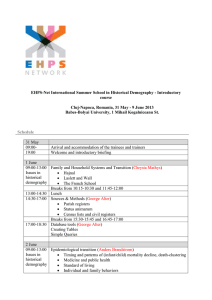Scheduling - Palomar College
advertisement

Page 1 of 4 + Tape 3- Scheduling Test Anxiety Principles of scheduling… It is very possible that knowing how to schedule time is the most important study skill. The top students of three Pennsylvania colleges thought so. Certainly when you graduate and enter an occupation you will work in a routine for our society more than any other demands regularity. Timekeeping, punctuality… To an adult American, time is like a material, a very valuable material, and often he or she pays considerable money for it. One of the few people who has time flexibility in this society, is the college student. Often much to his or her disadvantage, he or she must be in a specific place for 15 to 16 hours weekly, lecture hours. What he or she does with the other 150 odd hours is almost entirely up to the individual. There won't be any immediate penalties if he or she skips the lectures. This is freedom in the sense that you're never had it and you probably won't again. A certain number of students are reluctant to sacrifice this freedom. They claim that to do so is regimentation. They feel that they work best in cycles. Intense activity for three to four days in a cramming session followed by complete time off, but to what degree are non-scheduled students free? To what extent could a schedule provide you freedom? Here are several answers to that question. First, a habitual schedule would make coping with daily ordinary tasks less strenuous, less time consuming, more efficient process, and thus free you for creative work. Second, it would free you from uncertainty, mental conflict over which tasks to perform, guilt and fear of the future, all powerful and traditional slave masters of the college student. Third, by releasing you from such unpleasant tensions, the schedule would free time for other relaxation and careful social activities, as well as developing within you a sense of confidence and competence. There are important advantages other than freedom. First, the schedule if adhered to as if it were a law, becomes a very powerful motivation to take the place of parents and high school teachers in making you work. It is very likely one of the most powerful motivators. It is especially efficient at getting you to begin work. The most difficult moment of the study day. If constructed wisely, the schedule can provide you 10 or 15 moments of accomplishment during the work day motivating you further by the reward motive. Page 2 of 4 Second, it eliminates haphazard, inefficient and distracting time habits, and replaces them for the time saving routine that makes it certain that you will not accidently neglect certain duties. Third, it makes sure that you do each job at the best time for doing that job. Certain times of the day are definitely best for certain kinds of activities. Fourth, it will make certain that you are doing as much at least as the next fellow. Let’s see how much he or she actually does by examining this often quoted study. Turn to Figure 18. If we add study and lectures, we find that he or she works almost as hard as his father or mother; a 38-hour, 30 minute week. Some of these students did more holding down part-time jobs, adding about 12 and half hours weekly. Significantly by the way, their grades were in good condition. One very likely reason being that the working student has to schedule time. As a footnote to these statistics, I would like to add that the average good student studies slightly less than the average bad student. Why? They're more efficient and can't have efficiency without a schedule. That concludes my sales pitch on schedules. Now let's see how you make them. There are several background matters that we need to go into before we actually consider scheduling methods. We must consider these various problems. First, the virtue of spaced study periods versus lengthy solid periods, and mastering the contents of one subject. Second, the proper length of a study unit. Third, the best time to study during the day. Fourth, the nature and value of breaks. There has been considerable research done on most of these areas. First, to consider spaced study periods versus mass study periods. Would it be better for you to do your whole week study on one subject at one time, or should you space out the study periods? On the whole you learn better if you space out periods. If you work too long on one subject, your motivation dwindles, motivation fatigue, your output lessens and you have trouble assimilating any more material. There is an exception, however, to the generalization that spaced study is best. When you are attempting to gain an initial insight into a new subject to understand its central idea or to work out a problem, it is generally best to stick with it until you finish, up to about three hours. If you must start over again, you would have lost a good deal of ground. If then you were to space out the time, how much time should you devote to a subject and how long should a unit of study be? The rule of thumb on time spent is two hours of study to every hour of lecture, and one hour of study to every hour of lab. Your normal course will have three lecture hours. You should devote six hours of study to it just for a start. Obviously, this will vary for different courses. I'll show you later how to analyze your time. How long should the study unit be? It depends much upon the complexity and the size of the task and upon your character. In general, it is good to have about three study periods a week for each study. The study unit itself should not be less than 50 minutes unless memorizing or more than 90 minutes. Less than the former is inefficient, and more risks motivation fatigue, even though as I said, you may have to expand it for a complex task, problem solving or essay writing. Page 3 of 4 Average length of the study unit then is about one hour followed by a brief break and the next hour on another subject. There is some disagreement about breaks. Some advise you simply to take them when you need them, and others suggest a 5 to 10 minute break on the hour. Some advise you to forget about your subject during the break. Others advise you to concentrate on it and just use the break to relax your body. When you do take it, stand up, walk around, stretch perhaps take a short walk or a light refreshment if you are taking a 10 to 15 minute break after a difficult task. To avoid the clock watching, you might buy a timer. The breaks are invaluable. They not only relax the body, but they postpone the main study stopper, motivation fatigue. When you are slowing down in your work, and developing distaste for the subject, 5 to 10 minutes is very useful in restoring motivation. The break also adds motivation in another way; if you think of it as a reward at the end of an hour of hard work. Thus, you are stepping through the day hour by hour, instead of facing the demoralizing prospect of having to do 8 hours of work before there is any reward in the nature of having time off. To get you through the day you should have several breaks of different lengths to give you periods of relaxation to look forward to. This is pacing yourself, just as long distance runners would pace themselves. So don't only take your 5 to 10 minute hourly break; take these others. An hour off sometime in the afternoon, an hour off for lunch, two hours for dinner, a definite stopping point at no later than 10 p.m. and to get you through the week a definite stopping point at 5 p.m. Friday. Only four hours of morning work on Saturday and three hours of evening work on Sunday. So you will have from noon Saturday to 7 p.m. Sunday to do exactly as you wish free from worries since you had accomplished your scheduled tasks. Let's consider a final subject. The time of day that is best to do your work. Turn to Figure 19. These are efficiency curves. Each contains three factors; warm up, peak performance, drop off. In study, the warm-up period begins with a set. A firm focus on a definite task. As long as there is confusion on this point, you won't start. The set leads to decision which leads to the assembling of equipment, which leads to initial attention and reaction which builds into the initial stages of concentration. The peak of the curve is the period of full concentration, during which organization and comprehension occur. This is a curve which drops off only gradually and motivation fatigue sets in. A few calculated breaks will prolong this valuable period. Finally, there's the drop off caused by motivation fatigue rather than physical fatigue or caused by distraction. In some types of study, there is actually a drop off in the center of the study period so that the student is actually learning the beginning and the ending of his or her lesson before the center. You may watch out for this particular trap. Generally, however, efficiency curves develop as follows. They are the products of an experiment involving factory workers. In the morning, there is about a one-hour warming up period, a good two-hour peak, and a relatively gentle tailing off just before lunch. Observe that after the men or women resume work after lunch, they don't require the warm-up period. Actually they're at a higher level than they were just before lunch, but in the eighth hour of the day, the last of the afternoon, there is a sudden sharp slump. Page 4 of 4 A second study correlated body temperature with deficiency. The temperature varies during the day. At its high point, the work is alert and active. When sleepy, it drops. The result of this study indicated that in general, peak alertness is in the morning. In the afternoon, there is a drop off and the evening is worse. At 9 to 10, the temperature and alertness drop sharply. These and other such studies suggest that morning is the best time for the best work. Afternoon is particularly poor if the student has had a too heavy noon meal, lacks exercise or studying in a warm, stuffy room. What should you do then? Well, first attempt to determine your moments of peak efficiency. If you follow the norm and work well in the morning, so arrange matters the night before so that you can dress rapidly, spend the minimum time preparing breakfast and go immediately to a desk that already has the work neatly laid out. You have to push for a half hour or so at first, but by 8:30, you should be involved in concentration that will carry you through to lunch. A final note, if you are not alert in the morning, check diet, check sleep quantity, and don't drink during the week. Now let us consider in detail some of the techniques in scheduling reasons in the proceedings. First, you will want to run a time analysis to answer the following questions. Write them down. One, am I spending enough time on study? Two, is any particular activity taking up too much time? Three, do I waste time? How? When? Number four, how much time do I spend on each course? How long does it take me to read an assignment in each course? Number five, am I using the hours between classes effectively? Number six, am I making constant errors in estimating the amount of time I need for study? Number seven, do I have adequate breaks? Plan breaks. That is not impulsive ones. Number eight, am I doing each task at the best time to do it? Number nine, how do I compare with the average college student? Number ten, too much physical activity? Too little? Number 11, too much sleep? Too little? To answer these questions you need two forms. One a daily time record; two, the weekly time analysis sheet. I would suggest that you use them for one week preferably the second and third week after college begins. Time will have settled by then. You might analyze your time once more during the term and from time to time thereafter when you think that your habits might have changed. This is the conclusion of cassette number three.







